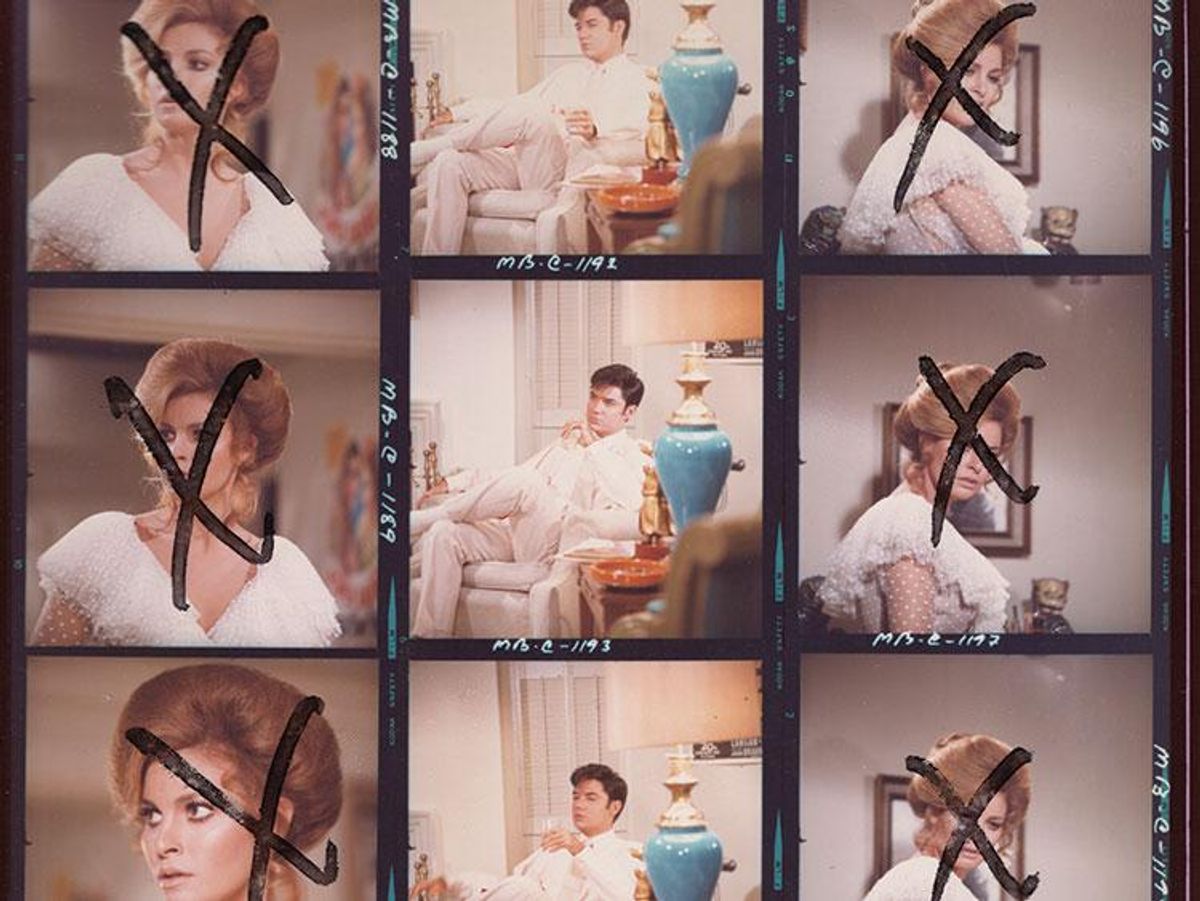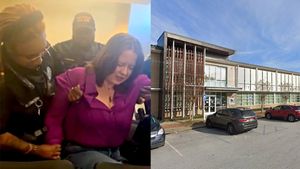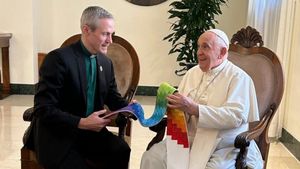Pictured: An original contact sheet of Raquel Welch and Rex Reed
When Gore Vidal's novel was published in 1968, it was a splashy bestseller, a smart-ass take on Americana, sexuality, and Hollywood, with the stylized, witty, transgender title character serving as our guide, trying to destroy the patriarchy while spouting asides about the golden age of movies.
Upon her arrival in Hollywood, Myra secures a job at an acting academy, where she destroys the relationship of one of her students and then anally rapes him with a strap-on dildo. There's also an orgy; a horny, aging female agent named Leticia Van Allen whose S&M predilections land her in the hospital; and dizzying soliloquies on the cinema of the 1940s.
A movie adaptation under Vidal's supervision was almost immediately greenlit. The film -- one of the last big studio projects of that era -- would premiere two years later and stain the reputation of all involved for decades. Raquel Welch lobbied for the role of Myra, and ended up wishing she hadn't. Critic and celebrity profiler Rex Reed took a break from his writerly duties and the talk show circuit to appear as Myra's alter ego, Myron, but half of his scenes weren't even filmed.
And Mae West returned to the screen for the first time in 27 years as Leticia Van Allen and waged a very public feud with Welch.
Overseeing it all was British director Michael Sarne, in over his head and unable to make sense of the script. Or rather, scripts, since the draft was constantly in flux. What was eventually released became one of Hollywood's most infamous flops, a strange hybrid of studio film, underground indie, and drug-induced psychosis.
Before There Was Myra Breckinridge, There Was Myra Breckinridge
RAQUEL WELCH: [The film] would be OK if it wasn't a box office hit, but worse than that, it just really didn't do [Vidal's] book justice. And his book was really, really funny and really, really had something. I read it cover to cover before I ever put myself up for it. I could not put it down; it was so funny to me, and I thought, If they ever do this and do it right, this could be a really great movie! It was such a big bestseller at the time, I thought they'd take that and run with it. But oh no.
 Welch examining Roger Herren's butt | Photo Credit: Everett Collection
Welch examining Roger Herren's butt | Photo Credit: Everett Collection
Will the Real Myra Breckinridge Please Stand Up?
No actress in Hollywood wanted to play a "transvestite" when the film started pre-production in 1969, but Welch -- a movie buff herself -- knew that Myra could be the breakout role she needed to shed her sex symbol image.
WELCH: I read it and I thought, You know, I could do this! I'd heard everybody had turned it down, and I just thought, Maybe this is a great chance to do something really fun with a lot of great dialogue. I had a meeting [with producer Richard Zanuck] and I said, "What about me playing Myra Breckinridge?" And he said, "Oh my God, that's a great idea!" I kept thinking he'd say, "Oh no, no, no, it's not right for you at all." But he loved it because he knew me personally. He knew me from before [I was] the girl from One Million Years B.C.
In or Out on the Joke?
Once Welch was cast, the rest of the film began to take shape. Reed came on board, and legendary director John Huston would play Myron's uncle, Buck Loner. Mae West would make her very first Technicolor film at the age of 76.
WELCH: The whole thing was a joke. I was cast first, but after that, they thought, Oh! Let's just do joke casting. I hate to say that about myself.
REX REED: The whole reason I did this picture was that George Cukor was going to direct [instead Fox hired Sarne]. And Bette Davis was going to play Leticia Van Allen, and Burl Ives was going to play Buck Loner.
WELCH: I do think Rex as Myron was a good idea, and he's a kind of stylized person and very specific in the manner he talks.
REED: And then the first big blow was that Bette Davis and Burl Ives dropped out. But they'd be replaced by Mae West and John Huston. Well, OK. And I was at George Cukor's house with Mae West and Greta Garbo. Raquel and I would go over there, and he would coach us. She won't admit it.
Whose Lines Are They Anyway?
After Vidal's script was deemed unusable, and Sarne's labeled so bad that eventual co-writer David Giler said it should be "hermetically sealed," Giler was brought on to synthesize the two versions, but the film was already in trouble.
WELCH: From the very get-go it was no good. And then I asked to see the one Gore had written. It wasn't what I expected it to be, either, but it was better than what they had done. All his ideas were cinematic metaphors for what was happening in American culture. It seemed more interesting and less arbitrary than what they were doing.
REED: They had all of us write an ending for the film. So I'm a screenwriter now. They didn't know how to end it! I wrote this scene, very cinematic, where Myron and Farrah Fawcett's character, Mary Ann, are walking down Hollywood Boulevard and they pass a memorabilia store, Mementos, and Myra is in the window trying to lure Myron back. And he tips a man, who lowers the shades, and he walks off with Mary Ann. And maybe that wouldn't have satisfied everyone, but it works.
WELCH: There was one rewrite that came through, and we were at the Hotel Bel-Air, and I was feeling so depressed about it that I went into the bathroom in John Huston's suite and had a little cry. And when I came out, he said, "Oh my goodness, darling, what seems to be the matter?" And I said, "The script keeps getting worse and worse." And he went, "Now, now, it's only a movie." As long as he was being paid to hang around while all these arguments were happening over something that was so trivial to him, he didn't care. I thought, Jesus, what a terrible way to meet John Huston!
REED: We were still filming when John Huston's stop date came. He just left.
WELCH: It was pretty much chaos. I thought, I asked for this role! I can't go into the office and say, "Dick, get me out of this crap."
REED: They had a scene with me running around naked, and I said, "Oh no. I have to go back to the New York Film Critics Circle and face Pauline Kael!" But I had it in my contract that I could say no.
 Raquel Welch in the infamous dress | Courtesy of Raquel Welch
Raquel Welch in the infamous dress | Courtesy of Raquel Welch
Welcome to Hollywood
Among the cast of screen icons was a handful of performers making their first forays into filmmaking, like Farrah Fawcett (whose only prior film credit was 1969's Love Is a Funny Thing) and Tom Selleck.
WELCH: Farrah was like Alice in Wonderland: She'd just dropped into this scene! And they kept changing the color of her hair all the time. She came to my dressing room in tears and said, "They've dyed my hair three different times, and now they're dying it again!" Well, Mae didn't like the color of her hair! And then I said to her, "Just tell them no." She said, "No? Tell them no?" And I said, "Yes, tell them no! It's totally ridiculous, isn't it? We're talking about a whim here. This has nothing to do with why they cast you. And it's making you feel insecure. Tell them no."
REED: Oh, they were always dying Farrah's hair. And Raquel was so mean to her. She treated her like a mule! Raquel really made things difficult for herself. She's a very insecure actress. I'd get contact sheets back, and she'd crossed out any photo where I looked great. And back then I photographed beautifully! She only left photos where I had my finger up my nose or something. And I went to her, because we were quite close during the making, and I said, "Raquel!" And she said, "Well, I don't care. Just tell them those photos are fine." See, she wanted to create a situation where you had to come to her.
The Butt of the Century
Also playing his first major role was Roger Herren as Rusty, the simple-minded, brawny young man who is raped by Myra. Production photos reveled in Welch examining his bare bottom, which columnist Joyce Haber dubbed "the butt of the century." Herren passed away in 2014.
WELCH: He was such a nice young man. He was really a nice kid. I didn't think of him as a kid then, but now I look at the pictures and he really was so green. We were all somehow in a spaceship to another planet, and we didn't know when we got on. He didn't have a clue about what was going on in that crazy scene. And all the time he was asking, "What is this? I'm so confused." And of course Michael would not explain anything to anybody.
Way Out West
Mae West's return to the screen was fraught with hard-nosed negotiations. She demanded and received star billing and the top salary for her supporting role -- and required the insertion of two songs for her character. And though Welch went to visit her at her apartment building prior to filming, they were never simpatico. Their costumes reflected their places in Hollywood at the time: Legendary Oscar winner Edith Head designed West's clothes; relative newcomer Theadora Van Runkle, who changed the face of fashion with her work on Bonnie and Clyde, designed Welch's.
REED: The first day of filming there was a press conference. And Raquel said, "I'm so happy to be working with Mae West. I've loved her ever since I was a little girl." And Mae West said, "I've never seen one of Raquel Welch's pictures. But I think she's a great little girl. Of course, no real woman would play this part."
WELCH: I didn't know what to think about her at the time. I had to go back and read a lot about her. I only knew the camp performance and I was thinking I might meet the real-life person, but that never happened. I don't know if she had a real-life person in there.
REED: Mae had it in her contract that she would only be filmed dressed in black or white. Now, that may seem odd for a Technicolor picture, but it's actually very smart because black and white will stand out. And I was all in salmon, and Raquel was in red.
50 Shades of Black
The story of West and Welch's sole scene together has become better-known than the actual film. The two never appear in the same frame, but both of them wear black-and-white ensembles.
WELCH: I went into the closet to get the fabulous dress, and there was nothing in it. My wardrobe assistant said, "Well, I brought it over from wardrobe this morning!" And I said, "It's not here now!" So I called [producer] Bobby Fryer in the front office from my dressing room, and he said, "Well, darling, I'm so, so sorry, but we had to confiscate the black dress!" Confiscate! I said, "I haven't heard that word since Nazi Germany!" He said, "Nobody's allowed to wear a non-color but Mae." Black and white are the only non-colors! I said, "Oh, is that so? Isn't that interesting? I'll tell you what. I'm going to go home for lunch. And when my dress reappears, so will I." Why did they all approve the sketches and the sample? They have to staple the fabric samples onto the sketch. This has all been approved! And now on the day of filming, she discovers I'm wearing this costume, and she's going, "Hell no." I guess Mae wanted me to carry her train and maybe crawl behind her in homage.
REED: Raquel had this red dress she was supposed to wear, and she cut it up! Then she wore that [black dress]. I don't know, maybe it was her own.
WELCH: What? It wasn't my dress. I did not confide in Rex about that!
 Mae West and Raquel Welch | Courtesy of Everett Collection
Mae West and Raquel Welch | Courtesy of Everett Collection
Shoot to Kill
REED: Everyone was coming to the set because everyone wanted to see what was going on. Of course, they all wanted gossip. Gore would call me every day at 5 p.m.
WELCH: When I got through with a scene, I would think, I don't know how this all strings together. I gave up crying about it when Huston told me it's not all that big a deal. That was a little pearl of wisdom -- latch onto it and look straight ahead.
REED: Christmas was coming, and everyone kept asking me, "Are we a wrap?" And I said, "No, we can't be! We still have all this to film." And so I went back to New York, and then I got a call saying, "Don't come back." They were going to edit together whatever they had. We hadn't even filmed half my scenes!
WELCH: I didn't really care anymore, to tell you the truth. I just did my bit. It was outside of my control. I stopped dreaming that it was going to be a wonderful film. I was hoping some miracle would happen and it would cut together in a way that might make it work. But I didn't have any specific ideas about that because Michael didn't have anything to say. He seemed to be making a Fellini movie! It doesn't have anything to do with Americana or the duality in the sexual roles.
Unleashing Myra on Audiences
REED: Sally Quinn was doing a big spread on me for The Washington Post, and I asked the studio to screen it for me. The two of us sat there in the screening room. And when it was over, she said, "Well, no one can blame you. You had nothing to do in it!" We didn't film half my scenes, and then they cut half of what we did!
WELCH: They didn't screen it for me, and I didn't ask. I didn't want to see it before I had to. They asked me to come to New York for the opening, and I did that. I pulled up in a car in front of the theater, and there was a big red carpet there and a lot of press and a lot of fans, and I walked a couple of paces -- and a bunch of bodyguards came and lifted me underneath both arms and pushed me inside. And I said, "What the heck is going on? I haven't been manhandled like this ever!" They said, "Well, Mae's car is right behind yours, and she did not want you to be on the red carpet at the same time she was." Bobby Fryer was so absolutely terrified of Mae, and Mae was so terrified of this movie and her whole image that it all sort of went neurotic. I was just along for the ride.
I realized, It's going to be a disappointment. I just hope it's not as bad as I think. I really didn't know what to expect, but I knew it wasn't good when we were making it.
The Aftermath
The reviews were in -- and they were scathing. Among the most memorable was Time magazine's decree that the film was "as funny as a child molester."
REED: I was able to buy a farm in Connecticut with what they paid me. I still go there every weekend. And I got to make a Technicolor movie. I had a dressing room -- it was Alice Faye's old dressing room. The studio gave me a convertible to use.
I have a lot of good memories and a lot of bad memories, but mostly I have really funny memories. And people wonder why I did it?
WELCH: I was terribly disappointed, but I got over it. I was under contract at Fox, and I had wanted to be in it, and I couldn't get out of it. If I had walked out, I think it would have been absolute death to me. You just carry on and get through it. But all of those things are just fun anecdotes about this forgettable movie.


































 Welch examining Roger Herren's butt | Photo Credit: Everett Collection
Welch examining Roger Herren's butt | Photo Credit: Everett Collection Raquel Welch in the infamous dress | Courtesy of Raquel Welch
Raquel Welch in the infamous dress | Courtesy of Raquel Welch Mae West and Raquel Welch | Courtesy of Everett Collection
Mae West and Raquel Welch | Courtesy of Everett Collection






















































